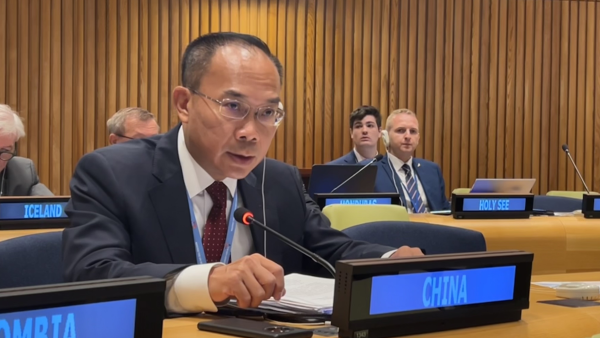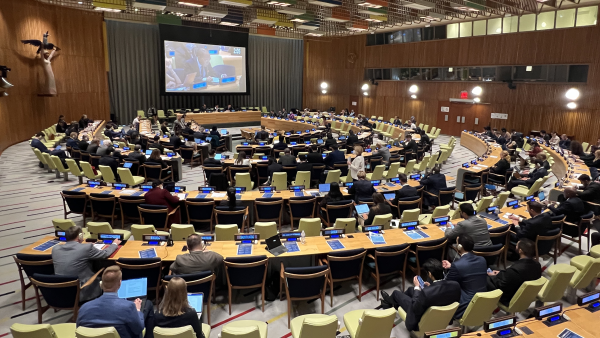
August 8th 2022 New York
Madam Chair,
On behalf of the Chinese delegation, I wish to congratulate you on your assumption of the chairmanship of the Committee, and assure you of our utmost support to you in promoting the success of our work of this Committee.
Madam Chair,
The NPT is the cornerstone of the international non-proliferation regime. The object and purpose of nuclear non-proliferation is, through the joint efforts of the international community, to firmly oppose and eliminate all forms of nuclear proliferation, properly handle the hotspot issues, and enhance common and universal security of all countries. States parties, especially nuclear-weapons States, should not adopt selective application of rules or double standards. Any attempt to utilize nuclear proliferation for narrow geopolitical self-interest runs counter to the original purpose of the NPT and seriously undermines the effectiveness and authority of the NPT.
Madam Chair,
Since the last Review Conference, the international political and security situation have experienced profound changes. Clinging to the Cold War mentality and the notion of strategic competition among major powers, the United States is promoting group politics and bloc confrontation, forming exclusive small circles and groups, and stirring up trouble in the Asia-Pacific. These negative policies and measures have brought new challenges to the international nuclear non-proliferation regime. At present, the nuclear powered submarine cooperation within AUKUS, and the clamor for nuclear sharing in the Asia-Pacific are two emerging issues facing the international nuclear non-proliferation regime. At the same time, nuclear issues of the Korean Peninsula and Iran are at a critical juncture. Where are the policies of the major countries headed, and whether the international endeavor will be effective or not, will have a significant impact on the evolution of these two hotspot issues. Therefore it is necessary for the states parties to give serious consideration to these issues at this Conference.
First, we should conduct thorough discussions on the AUKUS cooperation on nuclear powered submarine, and resolutely safeguard the international nuclear non-proliferation regime. Such cooperation is unprecedented and a textbook example of nuclear proliferation. The geostrategic intentions of the three countries are well known to all. As treaty depositories and nuclear-weapons States, the US and the UK have blatantly decided to transfer naval nuclear propulsion reactors and tons of weapon-grade highly enriched uranium to a non-nuclear-weapon State, posing serious proliferation risks and fully exposing their double standards. The AUKUS cooperation on nuclear powered submarine threatens the security of all countries in the Asia Pacific, provokes bloc confrontation, stimulates arms race, and severely undermines the South Pacific nuclear free zone and the Southeast Asia nuclear weapon free zone, and is a flagrant violation of the object and purpose of the NPT. China urges the three countries to change their course of action, revoke the decision to carry out nuclear submarine cooperation, and do something conducive to the peace and stability of the Asia Pacific.
The AUKUS cooperation on nuclear powered submarine poses a new challenge to the IAEA safeguards system. The international community is concerned about these negative developments and people with insight from various countries have raised serious questions. At the strong request and initiative of member states including China, the IAEA Board of Governors has included the issue in the agenda for three times. At this Review Conference, China and some other countries have further raised serious concerns. China has submitted a working paper on this issue, and believes that the relevant working papers submitted by Indonesia and Brazil as well as the views and concerns raised by other parties also deserve high attention and due consideration of the states parties, and these contents should be fully reflected in the Committee's report and the substantive Final Document of the Conference.
I would like to emphasize that the AUKUS cooperation on nuclear powered submarine is not a matter among the three countries themselves, nor is it a matter between the three countries and the IAEA Secretariat. The stakes are so high that there should be comprehensive, full and transparent discussions in the NPT review process and among IAEA member states. China advocates that the agency establish a special committee open to all member states to discuss all aspects of the above-mentioned cooperation and its related safeguards. The different positions and concerns of all parties should be put on the table for discussion. Pending the proper resolution of the relevant issues, the US, the UK and Australia should not engage in nuclear submarine cooperation and the IAEA Secretariat should not negotiate relevant safeguards arrangements with the three countries.
Second, we must take the issue of nuclear sharing seriously and resolutely oppose the proliferation of nuclear sharing in other parts of the world. During this Conference, NATO continues to claim itself as a nuclear alliance. In the context of the NPT, nuclear sharing has long been controversial and has never been fully and clearly recognized by all states parties. Running counter to the object and principles of the NPT, nuclear sharing is a form of nuclear proliferation in itself. Today, over half a century later, it is all the more necessary for NPT states parties to ponder over the severe negative impact of nuclear sharing on the international nuclear non-proliferation regime and on international and regional peace and stability. We urge the US to abolish the nuclear sharing policy and withdraw all nuclear weapons deployed abroad back home.
It is important to note the signs of nuclear sharing proliferating to the Asia Pacific. Countries in the region must stay alert to that trend. Recently, certain countries such as Japan have repeatedly been clamoring for nuclear sharing with the US. In the report submitted by Japan to this Review Conference, the Three Non-nuclear Principals mentioned in previous reports were removed. Does this imply a significant change in Japan’s nuclear non-proliferation policy? Japan owes the states parties and international community a clear explanation. Let me stress again that any attempt to replicate the nuclear sharing model in Asia Pacific is blatant nuclear proliferation and will meet firm opposition by the countries in the region and severe countermeasures if necessary.
China maintains that this Review Conference should send a clear message to the international community against the proliferation of nuclear sharing and other negative moves, urge the countries concerned to effectively implement their NPT obligations, abolish the current nuclear sharing policy, commit not to relicate nuclear sharing to other regions, and uphold the international nuclear non-proliferation regime and the peace and stability of the region and beyond.
Third, we should stay committed to the political and diplomatic settlement of nuclear issues of the Korean Peninsula and Iran and to avoid escalation and confrontation. These non-proliferation hot spots have complex historical background. The evolution of these issues are also closely related to the real attitude of a certain big power towards non-proliferation and the consistency of its related policies. History and practice have repeatedly proved that if the legitimate security concerns of the relevant countries are not taken seriously, and the right of the peaceful uses of nuclear energy is not fully respected, the threat of force and imposition of sanctions alone will not only fail to resolve the issues but also create new conflicts and confrontations. The object and purpose of nuclear non-proliferation should be firmly upheld. The UN Security Council Resolutions must be observed. Meanwhile, persistent political and diplomatic efforts are the fundamental solution to the issues.
China is concerned about the escalation of tensions on the Korean Peninsula. We have been committed to upholding peace and stability of the Peninsula and realization of the denuclearization of the Peninsula. We are not supportive of any action by any party that may escalate tensions. The crux of the Peninsula nuclear issue is the lack of a peace mechanism. The US only pays lip service about conducting dialogues, and has not responded to the legitimate concerns of the DPRK. Currently all parties concerned should stay calm and exercise restraint, stick to the direction of political settlement, and resolve respective concerns through meaningful dialogues in a balanced manner, promote the establishment of a peace mechanism on the Korean Peninsula and the denuclearization of the Peninsula.
The JCPOA is an important diplomatic achievement in the new century and an important pillar for upholding the international nuclear non-proliferation system and peace and stability of the Middle East. At present the negotiation on the resumption of compliance with the JCPOA has again come to a critical juncture, with a new round of diplomatic efforts going on in Vienna. All parties concerned should resolve the differences with mutual respect and clear the obstacles for reaching the agreement. The US, as the one who created crisis on JCPOA, should fundamentally lift the unilateral sanctions and “long arm jurisdiction” measures against Iran. Iran should, on this basis, resume implementation of its nuclear commitments. The discussions and actions in this Conference should be conducive to the diplomatic efforts in Vienna.
Madam Chair,
The Chinese delegation has submitted the working papers on nuclear non-proliferation and AUKUS cooperation on nuclear powered submarine to the Conference. Those documents have elaborated on China’s positions in a more comprehensive manner. We hope that these contents will be fully reported in the substantive Final Document of the Conference.
Thank you, Madam Chair.

